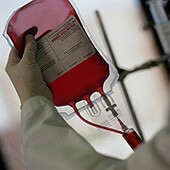
MONDAY, July 19 (HealthDay News) — Reusing an injured patients’ own blood during emergency surgery costs less and avoids the risks associated with using donated blood for transfusions, new research suggests.
During planned surgeries in which the patient is expected to experience significant bleeding into the chest cavity or abdomen, it’s common practice for doctors to suction patients’ blood, which is then collected in a canister, filtered and returned to the patient, researchers said.
However, reusing the patient’s blood is much less common during emergency surgeries that can occur after shootings, car accidents and other traumas, explained study author Dr. Carlos Brown, medical director of trauma services at University Medical Center Brackenridge in Austin, Texas. That’s because of the need to have a perfusionist or other specially trained member of the surgical team on hand to operate equipment and oversee the procedure.
If more trauma centers would do so, it would both lower costs and potentially avoid blood-transfusion related risks to trauma patients, including reactions to the donated blood and the transmission of infectious disease, Brown said.
In addition, the patients’ own blood is “fresher,” he said. Over time, blood stored in blood banks deteriorates and may not flow as well through the body.
“Normally when you are in the operating room doing surgery for trauma, the blood [lost by the patient] gets discarded,” Brown noted. “By setting up a ‘cell salvage system’, we can give the patients’ own blood back to them. It’s safer and costs less than getting blood from the blood bank.”
The study is published in the July 19 issue of the Archives of Surgery.
Injury from trauma remains the leading cause of death for people aged 1 to 44, according to background information in the study.
Blood loss plays a major role in as many as half of these deaths, especially for deaths that occur in the operating room or within the first 24 hours after injury. Patients who go into shock because they are hemorrhaging blood require transfusions, sometimes “massive” ones, according to the researchers.
In their study, Brown and his colleagues matched 47 patients undergoing emergency surgery who received their own blood with 47 people who received blood from blood banks. Patients were matched for age, gender, injury severity, type of injury and surgery.
Those who received their own red blood cells and plasma still needed some blood from donors, but only about half as much blood as the others, according to the study.
That helped bring the average cost down, from $2,584 for patients who received blood bank blood to $1,616 for those who received their own blood.
“In trauma, things move quickly and there’s not as much time for preoperative planning,” said Brown, an associate professor of surgery at University of Texas Southwestern Austin. “We just want to get the message out that if you can do this at your trauma center, you should.”
Dr. Jonathan Waters, chief of anesthesiology at MaGee-Womens Hospital, University of Pittsburgh Medical Center, and medical director for the blood management program, said researchers are right to push for greater usage of “cell salvage.”
“It’s way underutilized,” Waters said. “As medicine comes to realize the dangers of blood from somebody else, it will be utilized more and more. There is a litany of bad things that can happen with allogenic blood [donated blood]. If you can provide something at a lesser price and it’s better for the patient, you have a no-brainer.”
Waters uses the process in his hospital, once giving a woman who was hemorrhaging after giving birth 22 units of her own blood back — typically, a person has about 10 units of blood coursing through the body — meaning her blood was lost, filtered and returned to her multiple times.
Though there was no difference in patient outcomes between the two groups in the Texas study, prior research has shown that blood transfusions using donor blood are associated with an increased risk of death, independent of other factors.
Reusing the patient’s own blood also has the potential to help alleviate blood shortages, Brown said.
More information
Find out more about donated blood at the American Red Cross.

